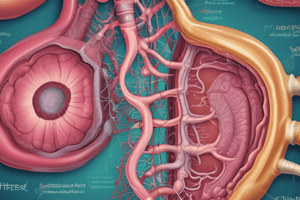Podcast
Questions and Answers
What is the mechanism of action of salt-containing osmotic agents?
What is the mechanism of action of salt-containing osmotic agents?
- They retain water in the lumen by osmosis (correct)
- They decrease the absorption of water from the intestine
- They inhibit the release of digestive enzymes
- They increase the contraction of intestinal muscles
Which of the following laxatives is used rectally?
Which of the following laxatives is used rectally?
- Polyethylene glycol
- Methylcellulose
- Psyllium
- Glycerin (correct)
What is the onset of action of salt-containing osmotic agents after oral administration?
What is the onset of action of salt-containing osmotic agents after oral administration?
- 12-24 hours
- 1-2 hours
- 3-6 hours (correct)
- 6-12 hours
Which of the following is a limitation of mineral oil as a laxative?
Which of the following is a limitation of mineral oil as a laxative?
What is the main use of salt-containing osmotic agents?
What is the main use of salt-containing osmotic agents?
Which of the following is a bulk-forming laxative?
Which of the following is a bulk-forming laxative?
What is the effect of lubricant laxatives on the absorption of water?
What is the effect of lubricant laxatives on the absorption of water?
What is the route of administration of sodium phosphates?
What is the route of administration of sodium phosphates?
What is the mechanism of action of osmotic agents, salt-free?
What is the mechanism of action of osmotic agents, salt-free?
What is the effect of adequate hydration on the action of osmotic agents?
What is the effect of adequate hydration on the action of osmotic agents?
Flashcards are hidden until you start studying
Study Notes
Stress-related Gastritis
- Act as prophylaxis for recurrent ulcers in patients at risk
- Can be treated with proton-pump inhibitors (PPIs) such as omeprazole, which reduces both meal-stimulated and basal acid secretion
Proton-pump Inhibitors (PPIs)
- Irreversible inhibitors of the H+/K+-ATPase proton pump in parietal cells
- Block the transport of acid from the cell into the lumen
- Indications: gastroesophageal reflux disease (GERD), peptic ulcer disease, nonulcer dyspepsia, stress-induced gastritis, and gastrin-secreting tumors (Zollinger-Ellison syndrome)
- Adverse effects: headaches, gastrointestinal disturbances, and reduction in acid production may permit bacterial overgrowth
- Major drug interactions: inhibit the metabolism of other drugs like warfarin, can result in drug toxicity
Prostaglandins
- Misoprostol (Cytotec) is a methyl analog of PGE1 that acts on parietal cells to inhibit acid secretion and stimulate bicarbonate and mucus production
- Increases uterine contractions
- Clinical uses: prevention of NSAIDs-induced ulcer, termination of pregnancy, and induction of labor (off-label)
- Side effects: diarrhea, abortion, premature birth, birth defects, and uterine rupture (life-threatening)
Protective Agents
- Sucralfate (Carafate) is a polysaccharide complexed with aluminum hydroxide that protects ulcerated areas from further damage and promotes healing
- Effects: stimulates mucosal production of prostaglandins, inhibits pepsin, and has side effects of constipation and nausea
- Used in critical care settings for stress-related gastritis
Antacids
- Weak bases taken orally to partially neutralize gastric acid and reduce pepsin activity
- Reduce the pain associated with ulcers and may promote healing
- Prototype agents: sodium bicarbonate, calcium carbonate (TUMS, Os-Cal)
Other Agents
- Histamine1 (H1)-receptor antagonists: doxylamine + Vit B6, meclizine, and promethazine, used to treat motion sickness and morning sickness
- Dopamine antagonists: metoclopramide, used to treat nausea and vomiting, with side effects of sedation, diarrhea, and motor dysfunction
- 5-HT3 antagonists: ondansetron, used to treat nausea and vomiting, with side effects of mild constipation
- Benzodiazepines: lorazepam, diazepam, used as anxiolytic agents to reduce anticipatory emesis
Agents Used to Treat Diarrhea
- Opiates and opioid-containing preparations: act directly on opiate µ-receptors to decrease GI motility and increase transit time
- Diphenoxylate: a synthetic morphine analogue used to treat diarrhea
- Loperamide: an opioid agonist with no CNS activity, used to treat diarrhea, with a potential for severe constipation
- Bulk-forming laxatives: psyllium and methylcellulose, used to treat constipation
- Osmotic agents: magnesium citrate, magnesium sulfate, magnesium hydroxide, and sodium phosphates, used to treat constipation
- Lubricant laxatives: mineral oil and glycerin, used to treat constipation, with limitations of decreasing absorption of fat-soluble vitamins
Studying That Suits You
Use AI to generate personalized quizzes and flashcards to suit your learning preferences.



